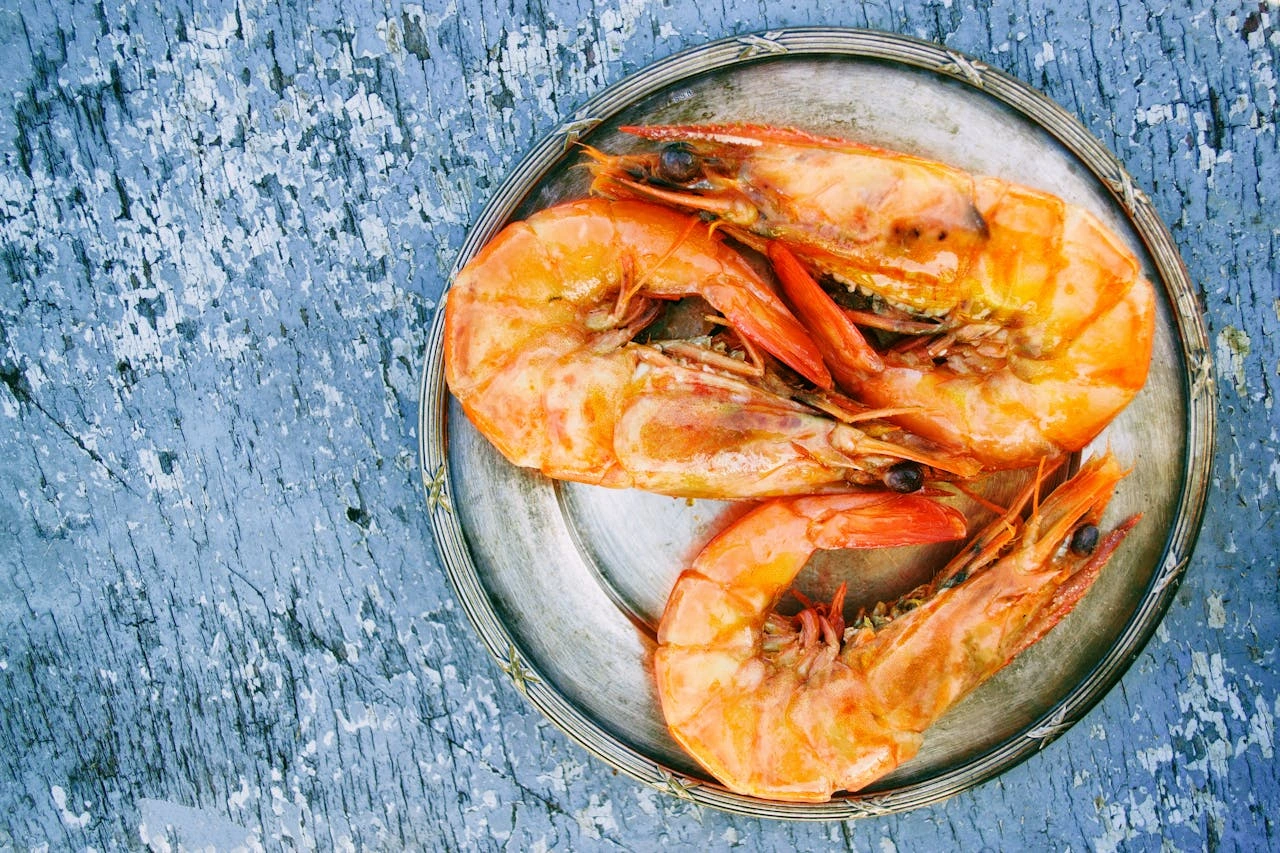Can Dogs Eat Shrimp? Everything You Need to Know
Can dog eat shrimp? Owners of pets need to verify that all treats maintain both health and safety standards. The seafood item shrimp maintains widespread usage in human diets yet remains an uncertain matter for canine consumption. Let’s look into the facts.
The following article provides information about whether shrimp should be included in your dog’s dietary plan. The following discussion will analyze both advantages and risks of this food choice. The article will teach you proper procedures for feeding shrimp to your pet without causing them any damage.
The protein and omega-3 content in shrimp exists though it does not fit into a basic yes or no decision. This article will present a method to determine the advantages relative to disadvantages. The proper feeding approach enables your dog to maintain good health. The following information explains proper steps for feeding shrimp to your dog.
Table of Contents
The Safety of Feeding Shrimp to Dogs
When thinking about is shrimp bad for dogs, it’s all about how it’s prepared and how much you give. Shrimp can be good for dogs if given right, but there are risks if not done right.
Potential Health Benefits of Shrimp for Dogs
Shrimp is a lean protein and has omega-3 fatty acids. These help with muscle health and a shiny coat. They also support joints and the immune system. Vets might suggest shrimp for active dogs as a low-calorie protein.
Understanding Shellfish Allergies in Dogs
Some dogs can have bad reactions to shellfish. Symptoms include swelling, hives, vomiting, or trouble breathing. If your dog has these signs after eating shrimp, call a vet right away. Allergies are rare but serious, so watch your pet closely when they first try shrimp.
Moderation and Portion Control
Even if your dog can handle shrimp, only give them 10% of their daily calories. A small dog might get one medium shrimp, while bigger dogs can have two to three. Too much can upset their stomach. Always give plain, cooked shrimp—no seasonings or bones.
How to Properly Prepare Shrimp for Your Dog
When thinking about can dogs have shrimp, it’s key to prepare it right. This ensures your dog stays safe and healthy. Here’s how to do it:
Removing the Shell and Vein
First, take off the shells, tails, and the dark vein. Shells can block your dog’s airway or cause blockages. The vein might have harmful bacteria. Make sure to rinse the shrimp well under water.
Cooking Methods: Boiled vs. Steamed
“Boiling or steaming at low heat preserves nutrients without adding harmful fats.”
Boiling or steaming is the safest way. Don’t fry, grill, or add butter or oil. Cook for 2-3 minutes to keep the shrimp moist. Let it cool down before giving it to your dog.
Avoiding Harmful Seasonings and Additives
Don’t add salt, garlic, onions, or spices. These can be toxic to dogs. Give your dog plain, unseasoned shrimp in small amounts. A few cooked shrimp as an occasional treat is best.
Always talk to your vet before trying new foods. With the right preparation, shrimp can be a safe, protein-rich treat for your dog.
Can Dogs Eat Shrimp Tails and Shells?
Can dogs eat shrimp tails? No, they can’t. Dog consumption of shrimp tails and shells is unsafe for their health. The consumption of shrimp tails creates a severe risk because they have the potential to cause choking incidents and blockages in the intestinal tract. The dangerous edges of these parts could potentially damage the digestive organs of dogs.
It is unsafe for dogs to receive shrimp tails at any amount. The parts contain no beneficial nutrients for dogs. The sharp edges of shrimp tails may become lodged in either the throat or intestines thus requiring immediate medical assistance. After cooking shrimp for dogs you should discard the shells and tails properly.
Contact a veterinarian immediately whenever your dog consumes shrimp tails or shells accidentally. You should watch for signs of vomiting along with extreme tiredness or loss of appetite in your pet dog. House shrimp leftovers properly to protect pets from accessing them. Your dog must avoid contact with shrimp shells and tails at all times.
Nutritional Value of Shrimp for Canines

Thinking about can dogs have shrimp means looking at what they offer. Shrimp is more than a tasty treat—it’s packed with nutrients that boost your dog’s health.
Protein Content and Muscle Development
Shrimp is a lean protein source, full of amino acids like taurine. This helps your dog’s heart and muscles stay strong. It’s a great choice for your dog’s diet, if done right.
Vitamins and Minerals in Shrimp
Shrimp gives your dog B12 for energy, selenium for a strong immune system, and zinc for healthy skin. These nutrients help your dog grow strong and fight off sickness.
Omega-3 Fatty Acids and Their Benefits
Omega-3s in shrimp fight inflammation and make your dog’s coat shine. They’re also good for dogs with joint problems, helping them move better and feel better overall.
When Shrimp Can Be Bad for Dogs
The health condition of your dog determines whether shrimp can be beneficial as an element in their diet. The cholesterol content in shrimp presents a risk to dogs with pancreatitis. This could make inflammation worse. The consumption of shrimp could trigger health reactions in dogs who have kidney problems or seafood allergies.
Before feeding shrimp to dogs with health issues consult with your veterinarian.
Salmonella bacteria exists in shrimp that has not been cooked sufficiently. Such exposure creates a significant danger for dogs who have poor immune function. The risk increases substantially for pregnant dogs along with those who are of advanced age.
Wild shrimp caught in nature contain mercury that builds up in the brain gradually leading to adverse effects.
| Risk Factors | Safety Tips |
|---|---|
| High cholesterol content | Choose low-mercury farmed shrimp |
| Potential bacterial contamination | Thoroughly cook shrimp to kill pathogens |
| Pre-existing allergies or kidney disease | Consult a vet before introducing shrimp |
Dogs on certain meds should avoid shrimp if their vet says so. Stick to fresh, well-cooked shrimp from trusted sources. Remember, not all dogs can safely eat shrimp. Your pet’s health is the most important thing.
Can Dogs Eat Fried Shrimp and Other Preparations?
If you’re wondering can dogs eat fried shrimp, the answer is clear: fried shrimp is unsafe. High heat and added ingredients in fried foods create risks your dog doesn’t need.
The Dangers of Fried Foods for Dogs
Fried shrimp contains high-fat oils and breading that can trigger pancreatitis or obesity. The crispy coating often includes seasoning like garlic or onion, which are toxic. Regular fried treats damage digestion and heart health over time.
Store-Bought Shrimp Products to Avoid
Commercial products like breaded shrimp rings, cocktail mixes with creamy sauces, or seasoned frozen shrimp should be off-limits. These items hide salt, preservatives, or artificial flavors harmful to dogs. Always read labels carefully—ingredients like onion powder or MSG are red flags.
Safe Homemade Shrimp Treats for Dogs
Create safe options by boiling or steaming raw shrimp. Pair shrimp with dog-safe veggies like carrots for fiber. Here’s how to make it right:
| Safe Option | Why It’s Safe |
|---|---|
| Boiled shrimp halves | No added oils or salt, easy to digest. |
| Shrimp and sweet potato mix | Veggies add vitamins without harmful fats. |
| Dehydrated shrimp strips | Low moisture preserves nutrients while avoiding grease. |
Always serve shrimp plain and in small portions. Never use butter or spices. Cooked properly, shrimp can be a rare, healthy snack—just skip the frying pan!
Conclusion: Making Smart Choices About Feeding Shrimp to Your Dog
Safety stands as a fundamental aspect when considering shrimp as a food for your canine companion. Proper cooking of shrimp produces a nutritious combination of protein and omega-3 fatty acids. Boil the shrimp before serving it to your dog while keeping it free of all seasonings.
Before giving shrimp to your dog you must verify their allergy status. Begin with a tiny portion to monitor their reaction. Stomach problems may occur in dogs due to shrimp consumption because the food contains high sodium levels and fatty seasonings.
The consumption of shrimp poses no harm but dogs should avoid making it a routine part of their diet. Shrimp functions best as a periodic snack for dogs. Pancreatitis patients among dogs should completely avoid shrimp consumption.
Before introducing shrimp as a food source for your dog consult with your veterinary expert. Your dog should receive a veterinary consultation about shrimp even without existing allergies.
The process of preparing shrimp plays a crucial role in its safety for dogs. Clean shrimp products by eliminating both shells and veins from the pieces. Fried or seasoned shrimp should never be served to dogs. The canine treat market includes shrimp-based products from both Blue Buffalo and Wellness CORE brands. When properly cooked homemade shrimp becomes a suitable option for consumption.
Observation of your dog needs to be constant during the first period after introducing new foods. This includes shrimp.
So, can dogs have shrimp? Yes, but with care. You should maintain their dietary balance and look for warning signs. Shrimp should only be given to dogs as an occasional treat. Consult your vet for maintaining your dog’s health in addition to following their advice.
FAQ
Can dogs have shrimp?
Yes, dogs can have shrimp in small amounts. It’s a good protein source and has nutrients. Just make sure it’s plain and without harmful additives.
Can dogs eat shrimp tails?
Dogs must keep away from consuming shrimp tails. Shrimp tails present a risk to dogs because they can lead to choking and also result in stomach problems including blockages or holes.
Is shrimp bad for dogs?
The consumption of shrimp does not cause harm to dogs as a whole. Dogs who suffer from shellfish allergies along with those dealing with pancreatitis need to stay away from shrimp consumption. You must always seek veterinary approval.
Can dogs eat fried shrimp?
Fried shrimp presents an unsafe food choice for dogs. Eating fried foods brings excessive fat to dog bodies that create pancreatitis alongside obesity and various additional health issues.
Are there nutritional benefits of shrimp for dogs?
Shrimp functions as an excellent protein choice for canine consumption. The food contains important vitamins and minerals as well as omega-3 fatty acids which promote dog health benefits.
How should shrimp be prepared for dogs?
To provide shrimp to dogs keep it well cooked while removing both shells and veins before serving it without any additional ingredients. The preparation method makes shrimp both safe and nutritious for dogs to eat.
Can dogs have shrimp in moderation?
Yes, giving shrimp in small amounts is okay. Treat it as an occasional snack to keep your dog’s diet balanced.
What should I do if my dog eats shrimp tails or shells?
Monitor your dog after it consumes shrimp tails or shells because vomiting or breathing complications could indicate a problem. Phone your veterinarian immediately when you have any concerns.
Are store-bought shrimp products safe for dogs?
Many store-bought shrimp products are not safe for dogs because of added seasonings or preservatives. Always choose plain, unseasoned shrimp.
What can I do if my dog is allergic to shrimp?
You should stop feeding shrimp to your dog immediately if you suspect shrimp allergies. After stopping shrimp feed immediately consult your veterinary professional for suitable protein recommendations.



